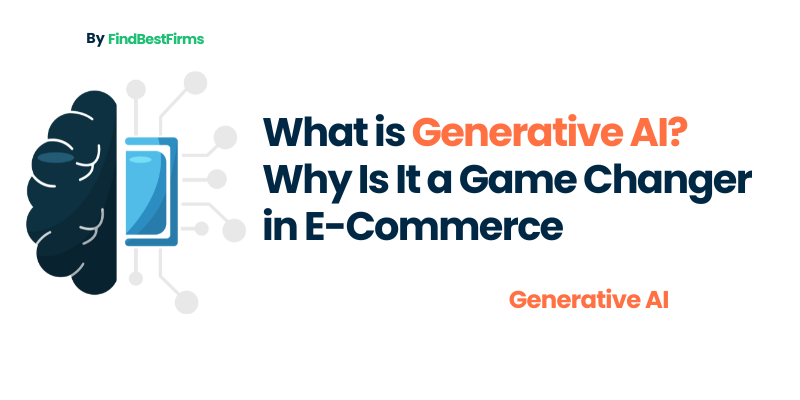The world of e-commerce is evolving rapidly, driven by innovations in technology. One of the most transformative advancements in recent years is Generative AI, a branch of artificial intelligence capable of creating content, simulating interactions, and enhancing user experiences. This blog explores the essence of Generative AI, its role in e-commerce, and how it’s revolutionizing the way businesses operate.
1. Introduction to Generative AI
1.1 What is Generative AI?
Generative AI refers to a subset of artificial intelligence focused on creating new content by learning patterns from existing data. Unlike traditional AI, which primarily identifies patterns, Generative AI produces entirely new outputs—whether it’s text, images, music, or even complex designs. Technologies like OpenAI’s GPT (Generative Pre-trained Transformer) and DALL-E are prime examples, demonstrating capabilities like drafting articles, generating artwork, or building prototypes.
1.2 Key Technologies Behind Generative AI
Generative AI relies heavily on neural networks, particularly deep learning models. These models simulate the human brain by processing layers of data to understand relationships and create something new.
2. The Growing Role of Generative AI in E-Commerce
2.1 Transformation of Online Retail
E-commerce is no longer just about selling products; it’s about creating seamless, personalized experiences. Generative AI empowers online retailers to cater to customer preferences more dynamically. By understanding user behavior, it enables platforms to suggest relevant products, deliver tailored content, and predict consumer needs.
2.2 Applications in E-Commerce
Product Recommendations:
Generative AI analyzes vast datasets to suggest products based on individual preferences, browsing history, and purchase patterns. This drives higher conversion rates and customer satisfaction.
Chatbots and Virtual Assistants:
AI-driven assistants simulate human-like interactions, helping customers resolve queries, track orders, and make purchases. These bots are more conversational and context-aware, ensuring a personalized touch.
Automated Content Generation:
Retailers can leverage AI to generate product descriptions, promotional emails, and social media posts, saving time and reducing operational costs.
3. Why Is Generative AI a Game Changer in E-Commerce?
3.1 Driving Hyper-Personalization
Modern consumers expect brands to understand their preferences and deliver tailored experiences. Generative AI facilitates hyper-personalization by analyzing user data in real-time. For instance, a customer searching for winter apparel might receive personalized recommendations, styling tips, and dynamic discounts, enhancing the shopping experience.
3.2 Enhancing Efficiency and Reducing Costs
Generative AI automates repetitive tasks, reducing the need for manual intervention. By streamlining operations like customer support and inventory management, businesses can focus on strategic growth. This efficiency is particularly beneficial for startups partnering with Top eCommerce Development Companies, as they can integrate AI solutions to scale operations seamlessly.
3.3 Revolutionizing Content Creation
Creating compelling content is resource-intensive. Generative AI simplifies this by generating high-quality visuals, ad copies, and even A/B-tested landing pages. This capability ensures that e-commerce platforms stay competitive while delivering engaging content tailored to their audience.
4. Benefits of Generative AI for E-Commerce Businesses
4.1 Improved Customer Retention
Predictive analytics powered by AI enables businesses to anticipate customer needs. For example, if a shopper frequently buys skincare products, the platform can suggest complementary items like sunscreen or serums, building loyalty through relevance.
4.2 Competitive Edge in the Market
Brands leveraging Generative AI can differentiate themselves by offering innovative services that resonate with tech-savvy consumers. AI-generated designs, customized experiences, and faster response times set them apart from competitors.
4.3 Scalability and Adaptability
For e-commerce platforms handling large volumes of customers, scalability is critical. Generative AI solutions ensure consistent performance even as traffic spikes, adapting to diverse requirements without compromising quality.
5. Challenges and Ethical Considerations
5.1 Data Privacy and Security
Generative AI thrives on data, but ensuring the privacy of user information is paramount. Mismanagement of customer data can lead to breaches, eroding trust and violating regulations like GDPR. Businesses must adopt robust security measures when integrating AI.
5.2 Avoiding Bias in AI Models
AI models are only as unbiased as the data they’re trained on. Generative AI can inadvertently reinforce stereotypes or provide skewed recommendations. Regular audits and diverse datasets are essential to maintain fairness.
5.3 Balancing Automation with Human Oversight
While automation improves efficiency, human intervention is necessary to ensure emotional intelligence and nuance in customer interactions. Businesses should balance AI-driven automation with human touchpoints to foster deeper connections.
6. Future of Generative AI in E-Commerce
6.1 Predictions for AI-Powered E-Commerce
The future of e-commerce lies in the integration of AI with other emerging technologies like augmented reality (AR) and virtual reality (VR). Imagine virtual fitting rooms powered by AI, where customers can try clothes digitally before making a purchase. Generative AI will also play a vital role in creating sustainable solutions, such as AI-optimized logistics for eco-friendly shipping.
6.2 Evolving Consumer Expectations
As consumers become accustomed to real-time, tailored experiences, the demand for innovative solutions will grow. Businesses must stay ahead by collaborating with Top Artificial Intelligence Companies that provide cutting-edge tools, ensuring they meet evolving expectations.
7. Conclusion
Generative AI is not just a technological advancement; it’s a revolutionary tool reshaping the e-commerce landscape. By enabling hyper-personalization, automating operations, and enhancing customer experiences, it provides businesses with a significant edge. From startups to established enterprises, leveraging Generative AI can lead to innovation and growth in unprecedented ways.
For businesses aiming to integrate such transformative technologies, partnering with Top eCommerce Development Companies can ensure seamless implementation. As the e-commerce industry continues to evolve, Generative AI will undoubtedly remain at its forefront, driving innovation and creating value for businesses and consumers alike.


